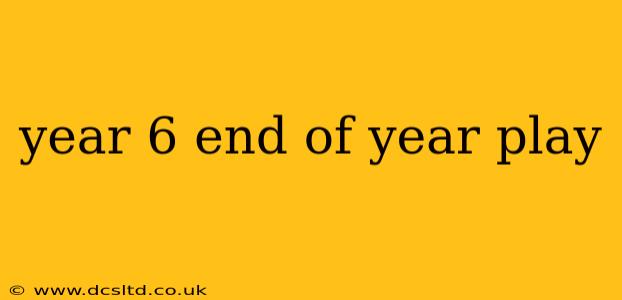The end-of-year play is a cherished tradition in many primary schools, a culmination of a year's hard work and a chance for Year 6 students to shine. This guide offers advice and ideas for parents and teachers involved in putting on a memorable and successful production. From choosing the perfect play to managing costumes and rehearsals, we'll cover all the essential aspects to ensure a smooth and enjoyable experience for everyone involved.
What Makes a Good Year 6 End-of-Year Play?
Choosing the right play is crucial. Consider these factors:
- Length: Year 6 students have shorter attention spans than older actors, so a shorter play (around 45-60 minutes) is generally preferable. Avoid anything overly complex or lengthy.
- Role Variety: The play should offer a range of roles to showcase the talents of all students, from leading characters to supporting players. Consider the personalities and strengths within your class.
- Engagement: Select a play with a captivating storyline, humorous moments, and opportunities for audience interaction.
- Technical Requirements: Assess the resources available to your school. Can you manage elaborate sets and costumes, or do you need something simpler?
What are Some Popular Play Choices for Year 6?
The ideal play depends on the specific skills and interests of your students and the resources available. Some popular themes for Year 6 plays include:
- Classic Fairy Tales with a Twist: Give well-known stories a fresh, modern spin.
- Original Scripts: Collaboratively write a play based on the students' own experiences or interests.
- Musical Theatre: If your students enjoy singing and dancing, consider a musical with age-appropriate songs and choreography.
- Comedy Plays: Humor is always a great way to engage both the actors and the audience.
How Long Does it Take to Rehearse a Year 6 Play?
Rehearsal time will depend on the complexity of the play and the availability of rehearsal space. Aim for at least one to two rehearsals per week, starting several weeks before the performance date. Shorter, more frequent rehearsals can be more effective than long, infrequent ones. Break rehearsals into manageable chunks, focusing on specific scenes or elements each time.
What are Some Common Challenges in Putting on a Year 6 Play?
Several challenges might arise during the production process. Proactive planning can help mitigate these:
Managing Different Student Abilities and Personalities:
Some students may be more confident than others. Encourage collaboration and create a supportive environment where all students feel valued and comfortable. Assign roles that suit individual strengths and interests.
Balancing Rehearsal Time with Other School Activities:
Effective time management is key. Schedule rehearsals strategically to avoid conflicts with other school events and extracurricular activities. Communicate clearly with parents about rehearsal schedules and any required commitments.
Costumes and Set Design:
Consider using simple, affordable costumes and sets that can be easily created using readily available materials. Involve parents and students in the creation process to make it a collaborative effort and reduce costs.
Handling Stage Fright:
Reassure students that stage fright is normal. Provide opportunities for them to practice their lines and movements in a relaxed environment. Encourage positive self-talk and remind them of their hard work and preparation.
How Can Parents Help with the Year 6 End-of-Year Play?
Parental involvement is invaluable. Parents can assist with:
- Costume creation: Help with sourcing or making costumes.
- Set building: Assist with constructing simple sets.
- Backstage support: Help with backstage duties on the day of the performance.
- Fundraising: Help raise funds for costumes, sets, or other production costs.
What Happens if a Student Forgets Their Lines?
Rehearsals should build confidence and familiarity with the script. However, occasional forgotten lines are inevitable. Encourage students to develop coping strategies, like pausing, taking a deep breath, and looking to a fellow actor for a cue. If a student forgets a significant portion, other students should be prepared to improvise slightly to help maintain the flow of the play.
What are Some Fun and Engaging Play Ideas for Year 6?
Consider plays that incorporate elements of improvisation, storytelling, or audience participation for a more dynamic experience. Modern adaptations of classic tales, or plays centered around relevant themes like friendship, teamwork, or environmental issues can engage the students and offer valuable learning opportunities.
By carefully planning and executing each stage, the Year 6 end-of-year play can be a truly memorable and rewarding experience for everyone involved. Remember to prioritize collaboration, communication, and fun throughout the process!
